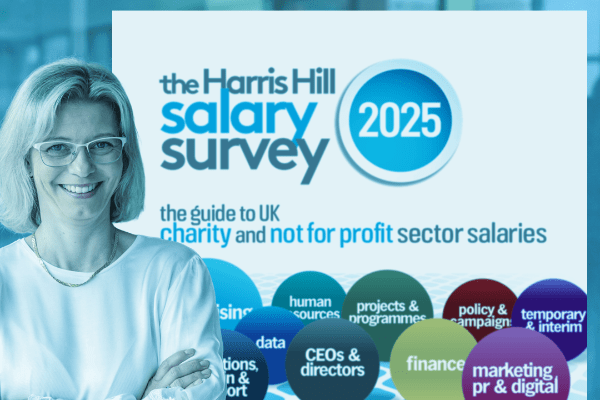You've made an offer to the brilliant candidate who won your panel's heart. Sadly, that means rejection for the other interviewees. But as Dawn Ballard explains, giving useful feedback can be vital for remaining on good terms - and for your desirability as an employer.

You're great at supporter care? Fantastic. And the care for your beneficiaries is second to none. But what about those who apply to work with you?
Working with all kinds of charities right across the sector we know that every organisation has unique pressures and challenges. But one that's shared by just about everyone is the difficulty of finding - and securing - candidates with the experience they need. In most areas, there just aren't enough to go round.
The long-term solution can only be to invest in opportunities and training for new entrants to the sector. But for now, if you can't increase the pool of candidates, what you can increase is how much those candidates want to work for you.
And the good news is that it needn't cost a penny: simply making sure that every applicant goes away with a positive impression - even if they don't get the job - can add to your reputation as an employer and push you further up the wishlist.
The initial rush of excitement
Here's a common scenario.
You have a vacancy and want someone brilliant to come and join your organisation and your team. You speak to a recruitment consultant who understands your field (*waves*), telling them how great the role is and how amazing you are to work for.
Your consultant, who's probably bounced out of bed at 5am for a ten-mile run, stopping only to tend flowers and injured kittens, channels your enthusiasm and excitement to the strongest selection of suitable candidates they can find, encouraging them to apply.
Candidates do their research which confirms you're amazing and it's a fantastic opportunity. They love what you do and how you put your message across, and spend hours crafting a supporting statement explaining why they'd love to be an advocate for you.
They tell their family and friends - excitement and buzz all round - and their application impresses you enough that you want to meet them for an interview. They research some more, practice and prepare as the hopes and nerves build. They take annual leave or sneak out of work to attend the interview...
Then what?
Unfortunately, for those who don't get the job, the answer is all too often: not a lot. A brief 'sorry you weren't successful' email, maybe even less. Which isn't just disappointing for them, but for their impression of the organisation too.
Of course your main focus is quite rightly the brilliant candidate you've offered the job to, but it's always worth considering the impression you'll leave with everyone else.
If you're working with a decent recruiter (*waves again*) who has a clear brief, you're unlikely to be interviewing anyone who's totally unsuitable. Far more often you'll have a selection of capable candidates, from which there might be an obvious standout or a trickier choice between two or three.
Whatever the number, remember they've all put considerable time and commitment into their application - otherwise you'd have rejected them already. They're applying because they respect your brand, and as a hiring manager the interview is a perfect chance to be an advocate for your charity. Why not take the opportunity to create some more too?
Making the right impression
Your candidates already have a positive view of your organisation, so all you need to do is maintain it. Which means:
Being courteous and professional throughout. Few things put a candidate off faster than an interviewer who's forgotten they're coming, turns up 25 minutes late or clearly hasn't read their application.
Being open, friendly and sincere. There's a time and a place for your 'bad cop' routine - calling your broadband provider perhaps, or just in the privacy of your own home (we won't ask) - but it's not in an interview where you're aiming to demonstrate your charity's values.
Keeping things simple. Jumping through unnecessary hoops will never appeal (unless you're recruiting border collies and have excellent treats).
Following up the interview as soon as possible with constructive feedback, including a clear reason for your decision, and genuine appreciation for the time and effort they put in.
Many hiring managers are great at the first three points, some with all four - but it's surprising how many fall down when it comes to feedback.
____________________________________________
Staying on good terms
In many cases, a candidate may not have been right for the role, but could be ideal for another in the future. There might be an area that other candidates were stronger in. Or you may simply have felt they weren't right for the organisation at all.
Whatever the case, it's worth leaving them feeling as positive as possible. You won't need us to tell you the charity sector is relatively small, close-knit and loves to talk! A negative impression can easily be passed on to friends and colleagues in the sector, and the more that reputation spreads, the tougher it may be to recruit in the future.
Breaking the news
Hopefully you've had a direct and honest conversation in the interview and most candidates will appreciate the same approach, whatever the outcome. Be clear on when they'll hear from you and stick to it - even if the decision gets delayed, keep them posted. And if they've dutifully slogged through a 30-page application form, supporting statement, three interviews and a role-play exercise, it's worth considering what that two-line auto-rejection letter is really saying about the organisation.
But whatever your decision, and whether directly to the candidate or their recruitment consultant, please do give your feedback. It needn't cover every last detail, but what's most valuable is constructive criticism, with a clear reason why they weren't selected.
The more information recruiters have, the better we can work with candidates to find the right role next time. And the more recruiters can find you the right candidates, the happier you'll be too.
After all - most of the people you interview won't get the job, but if you've impressed them in the process, you might just have gained some supporters - and you can never have too many of those!
Dawn Ballard, Senior Consultant (Fundraising), Harris Hill
-

Opportunity for all
Find out how we’re working to deliver more diverse, equitable and inclusive recruitment…
-

Recruiting a charity CEO?
Our executive recruitment specialists have an exceptional record of successful CEO, chair, trustee and…
-

Charity sector salaries
Our 2025 Salary Survey has the latest rates and expert insight for roles throughout the sector.













